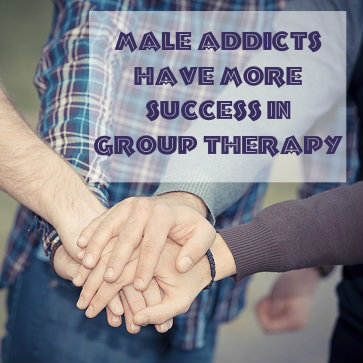Study Finds Male Addicts Have More Success In Group Therapy
As a rule, people affected by drug or alcohol addiction benefit from some sort of psychological or behavioral counseling that can help them successfully discontinue substance use and learn how to maintain substance abstinence over time. Some treatment programs feature individualized counseling sessions that only include a therapist and a single patient, while others feature group counseling sessions that include a therapist and multiple patients. In a study published in late 2013 in the Journal of Groups in Addiction & Recovery, researchers from two Canadian institutions compared the rate at which participants in individual counseling-oriented programs successfully complete addiction treatment to the rate at which participants in group counseling-oriented programs complete addiction treatment.
What Is Individual Counseling?
 Individual counseling-based programs for addiction treatment rely on a therapeutic relationship between a therapist and a single patient/client to achieve the treatment objectives common to all forms of substance-related counseling. Typically, individual therapy takes place in sessions that last 30 minutes to an hour; the specific techniques used in each session depend upon the therapist and the guiding principles of the program in which he or she is involved. In most cases, a recovering addict participates in a single one-on-one session with his or her therapist per week. However, some programs make provisions for as many as three or more sessions per week or for sessions that only occur every 30 days or more. Because of its relatively high cost, individual therapy is used less often than group therapy as a treatment for substance abuse or substance addiction.
Individual counseling-based programs for addiction treatment rely on a therapeutic relationship between a therapist and a single patient/client to achieve the treatment objectives common to all forms of substance-related counseling. Typically, individual therapy takes place in sessions that last 30 minutes to an hour; the specific techniques used in each session depend upon the therapist and the guiding principles of the program in which he or she is involved. In most cases, a recovering addict participates in a single one-on-one session with his or her therapist per week. However, some programs make provisions for as many as three or more sessions per week or for sessions that only occur every 30 days or more. Because of its relatively high cost, individual therapy is used less often than group therapy as a treatment for substance abuse or substance addiction.
What Is Group Counseling?
Group counseling-based programs for addiction treatment rely on the natural human dynamic of group interaction to achieve typical goals such as regular attendance at counseling sessions, avoidance of a relapse back into substance use and the establishment of a solid foundation for ongoing substance abstinence. Depending on the program in question, group therapy can place a particular emphasis on any one of a number of recovery-related issues also commonly addressed in individual counseling-based programs. These issues include educating participants about various aspects of abuse and addiction, helping participants understand their underlying psychological/emotional motivations for substance use and helping participants establish mental and behavioral skills that can form the basis for a substance-free daily routine. Recovering addicts enrolled in group counseling-based programs may attend regular group sessions for as long as half a year to a year.
Comparing Completion Rates Of Both Types
In the study published in the Journal of Groups in Addiction & Recovery, researchers from Canada’s Western University and the Centre for Children & Families in the Justice System compared the rate of client/patient retention in individual therapy programs for substance abuse/addiction to the rate of client/patient retention in group therapy programs. They decided to undertake this work after finding out that the vast majority of voluntary enrollees at a Canadian agency for addiction treatment failed to complete their program participation.
The researchers concluded that the average recovering addict enrolled in a group therapy-based program is roughly 100 percent more likely to successfully complete his or her treatment than the average recovering addict enrolled in an individual therapy-based program. However, they also concluded that the majority of the difference in success rates between the two counseling approaches is gender-related. Broadly speaking, men participating in addiction recovery are more likely than women to drop out of any form of treatment. Still, men who participate in group therapy-based programs have a much higher treatment completion rate than men who participate in individual therapy-based programs. Conversely, the researchers found that women tend to complete individualized addiction therapy just as often as they complete group addiction therapy.
The conclusions made by the authors of the study published in the Journal of Groups in Addiction & Recovery indicate that doctors may need to take their patients’ gender into account when making recommendations for participation in either individual therapy or group therapy for addiction treatment. Further research will be needed to fully confirm the gender-related differences in the program completion rates among recovering addicts. While some programs rely only on individual therapy or group therapy, others combine the two approaches, largely because each approach typically produces some unique potential benefits for participants. This means that men in some programs who don’t respond well to individual therapy may still achieve their treatment objectives through regular attendance at any available group therapy sessions.
Read About How Drug Rehab Programs Rely On Science To Develop Effective Addiction Treatment Methods



